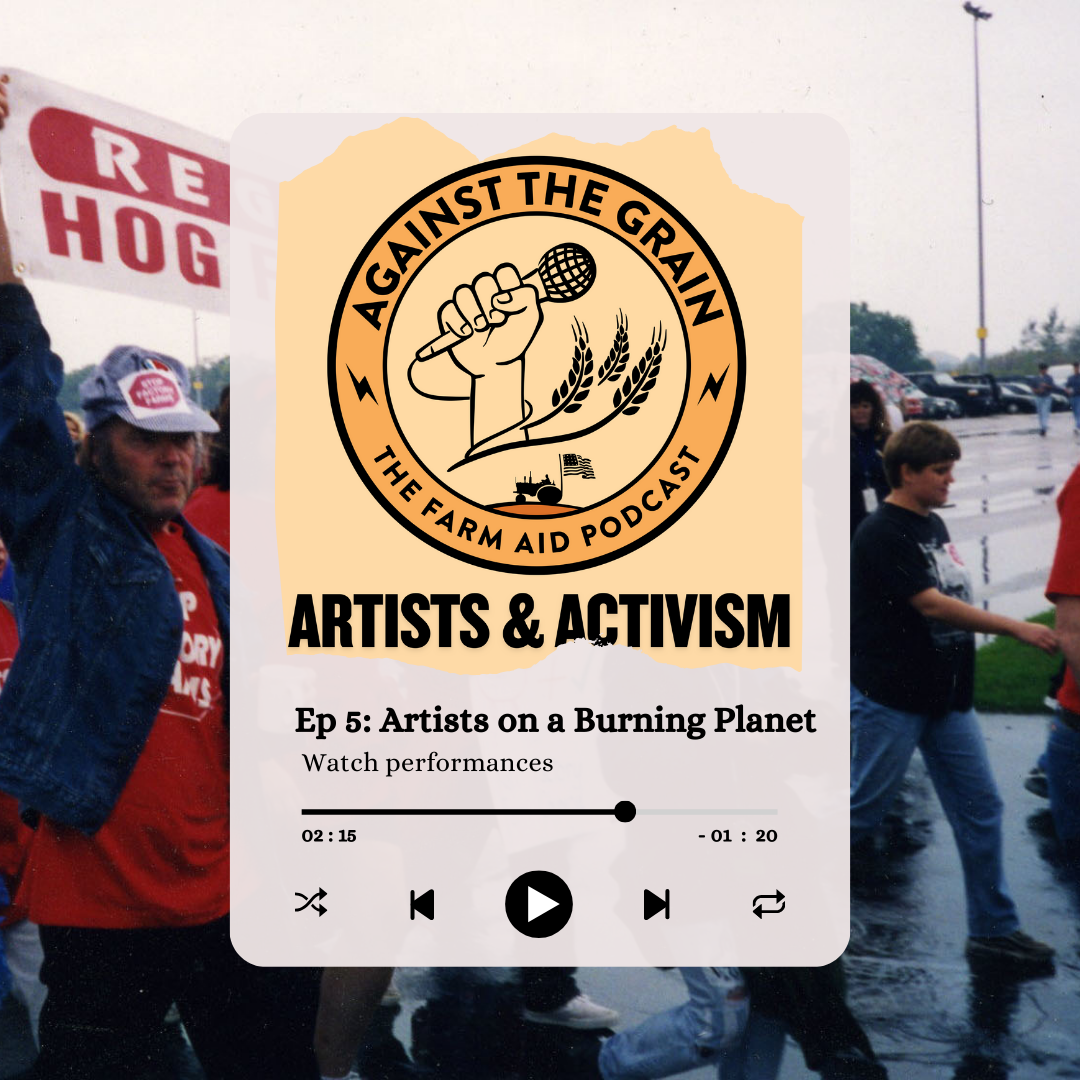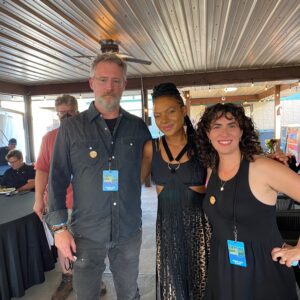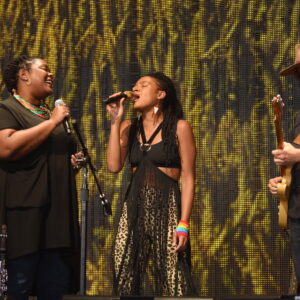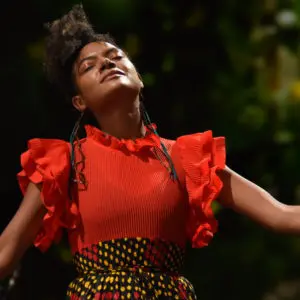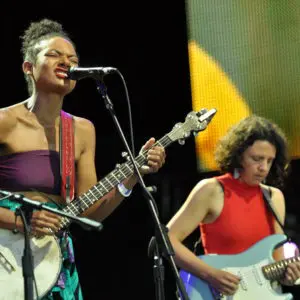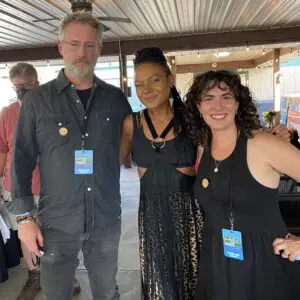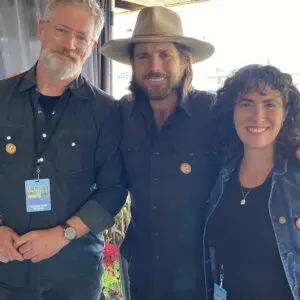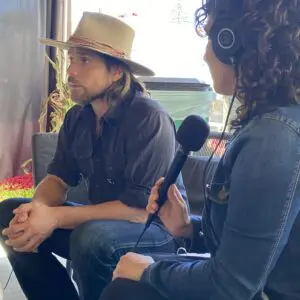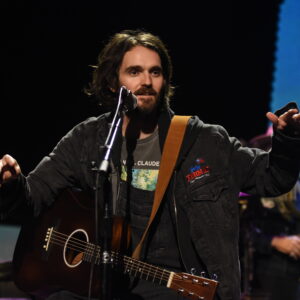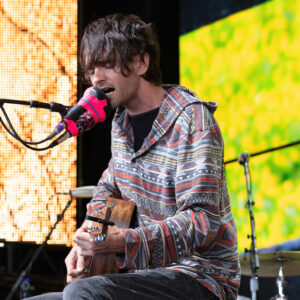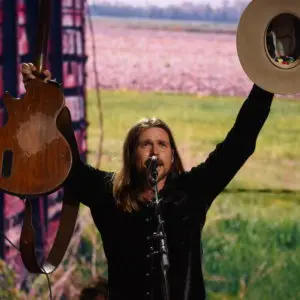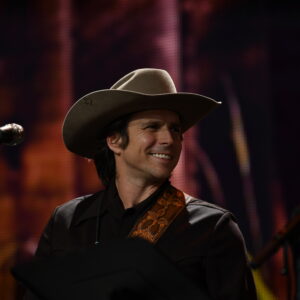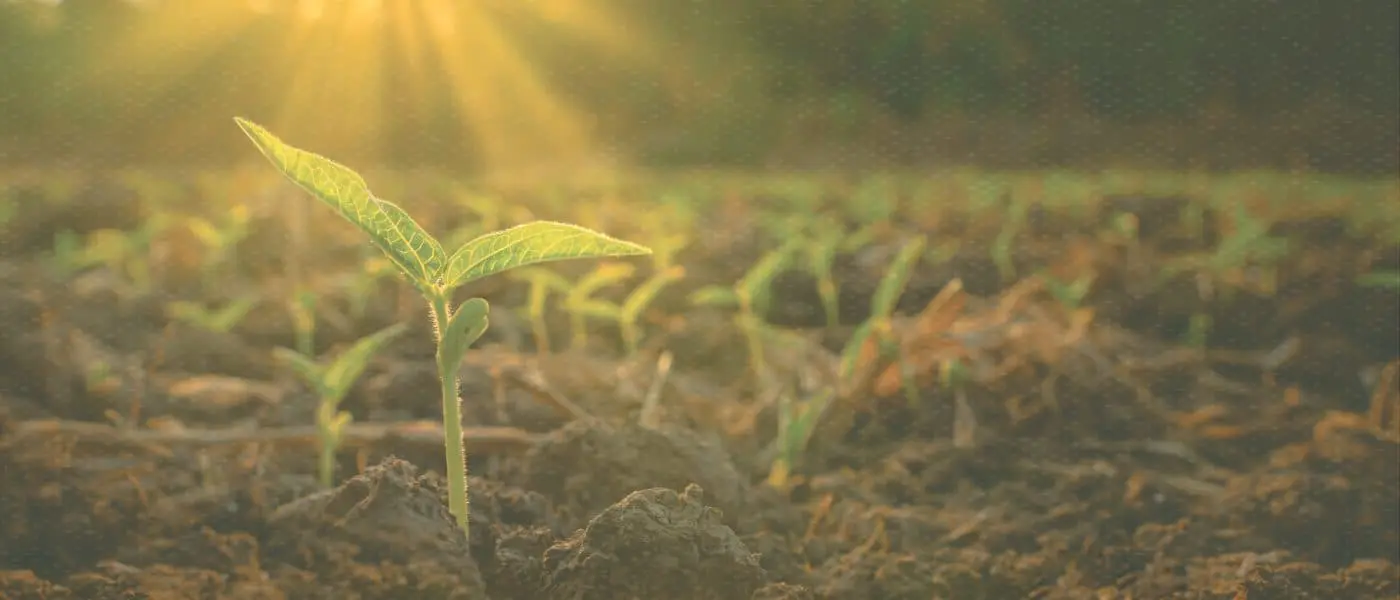In this fifth episode of Against the Grain’s series on artists and activism, we talk to Lukas Nelson, Micah Nelson and Allison Russell about their experiences with climate change at home and on the road, and what artists — and all of us — can do about it. Lukas discusses showing up for his community in the face of the Maui wildfires; Micah talks about the role of community and science in addressing climate change; and Allison champions the transformative power of regenerative farming practices in saving our food system and ourselves.
Listen to the episode below. And, make sure to subscribe in your podcast app of choice!
Companion Video Playlist
Watch artists featured in this episode in this video playlist!
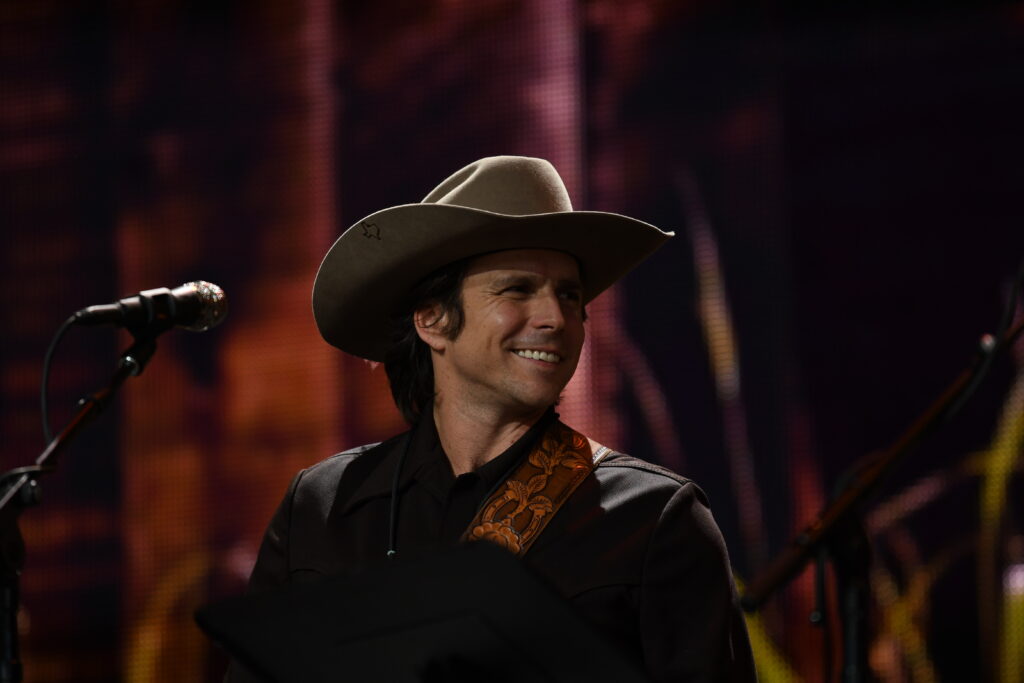
Lukas Nelson at Farm Aid 2024. Photo © Sharon Carone
Since he was old enough to walk, Lukas Nelson has been on the move. He was raised in a beloved musical family and then, as a young adult, released a series of thrilling projects over 15 years of leading his own band Promise of the Real. Along the way, he came of age in the dives and diners of this country and his itinerant life showed him America as few others get to see it.
The prolific Nelson always tries to keep his senses open for the muse and let her speak through him, lest she up and leave him. “If I were more closed off or if I ignored her, she’d probably move on to another guy,” he says. “At the same time, I never want to keep her to myself and I never try to ask her for more than she’s willing to give.”
It goes back to Nelson’s conception of feeling like he has enough and of his unique experiences supplying him with abundant inspiration. American Romance is a stirring story about the place that made it possible, playing out like a series of chapters from his life. “The heartache that America has brought me and the joy that it has brought me,” he muses, “It’s all led to where I am right now.”
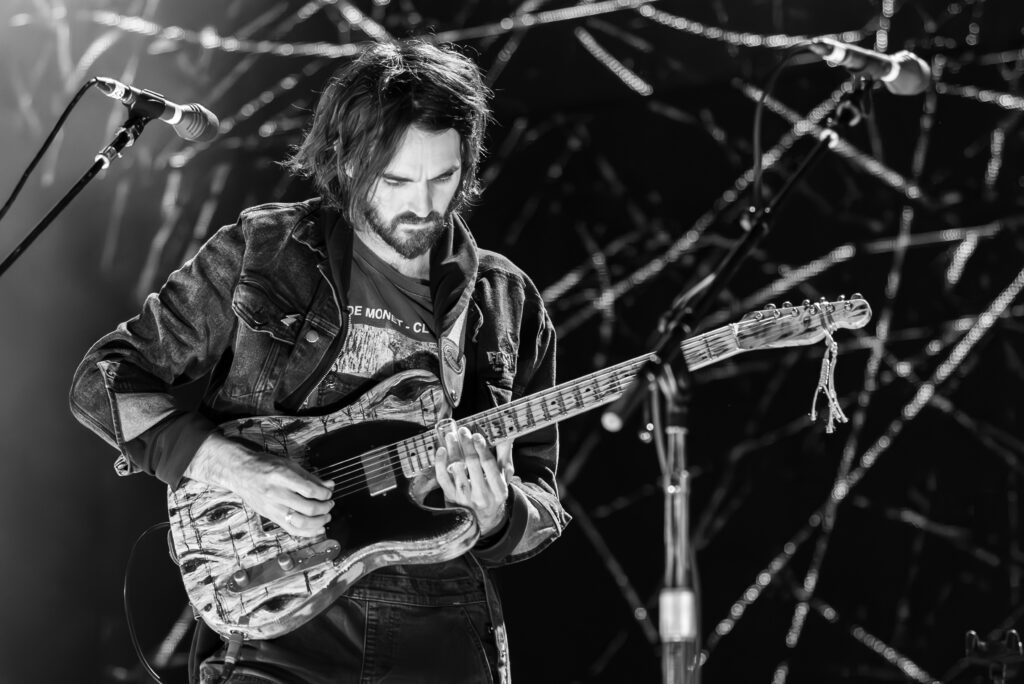
Micah Nelson at Farm Aid 2024. Photo © Laurie Bonneau
Composer/multi-media artist Micah Nelson has a remarkable output that spans the creative spectrum. The visionary, who Rolling Stone magazine hailed as one of their “New Classics” (“The creative visionaries celebrated here come from the worlds of music, acting, comedy, sports and more. …they share a refusal to be contained by the rules of the past as they define the territory of the future”), produces art under the moniker Particle Kid and finds no boundaries in his creativity.
Particle Kid has released six albums of his original music, including his most recent release Time Capsule, a 26-song musical journey through time, space, and consciousness. It features guest appearances from Jim James, Sean Ono Lennon, J Mascis, Margo Price, The Lovely Eggs, and Micah’s dad Willie Nelson on three tracks including “Die When I’m High (Halfway to Heaven).” His previous albums – self-titled debut Particle Kid, Everything Is Bullshit, Particle War, Window Rock, Live! Underground – are just part of the catalog of work Nelson has amassed with other artists and musicians. He was chosen by Neil Young to become a member of his band Crazy Horse as well as the Chrome Hearts, and Nelson was also featured in Young’s full-length film Paradox. For Record Store Day in 2018, he released Lucky Wheel, a split 12” vinyl collaboration with punk legend and X co-founder John Doe. Micah also produced Willie’s studio album Last Leaf on the Tree, which features songs written by Micah and Willie as well as Willie interpreting songs by Neil Young, Keith Richards, Tom Waits, Beck, Flaming Lips, Nina Simone, and others. On tour year round, Particle Kid has headlined shows around the world as well as opened for many other artists including The Flaming Lips, Tinariwen, Meat Puppets, Claypool Lennon Delirium, and been part of the line up for Luck Reunion, BottleRock Festival, UTOPiAfest, and the Outlaw Music Festival.
As an industrial hemp activist, Particle Kid has served on the National Hemp Association’s Board of Directors, participates in Farm Aid events and their annual music festival, and combined the missions of both organizations when he spearheaded a Change.org (http://change.org/) petition championing the Industrial Hemp Farming Act which became law in December 2018. Combining his passion for music and hemp, for his album Time Capsule the artist hand-made 20 actual time capsules constructed from hempcrete. Purchasers of the Time Capsule CD set have a chance of winning a ‘Time Token.’ Each of these randomly hidden tokens can be redeemed for one of the 20 hempcrete time capsules that contain a thumb drive that includes the record and videos, printed album artwork, industrial hemp seeds that Nelson cultivated himself, and a physical ticket that gains general admission to every Particle Kid concert in the year 2042. Nelson states, “I hope that incorporating industrial hemp into my art will help educate people not only on the crop’s many sustainable functional uses, but how it was deeply entwined with our nation’s history and the history of the world.”
For nearly a decade, through his production company (which also includes his wife Alex Dascalu Nelson aka Sisterlu), Spitball Pictures, he has created music videos and films for his own music projects as well as for other artists. His productions include music videos for Edie Brickell & New Bohemians (“Tripwire” and “My Power”), Promise of the Real’s Anthony LoGerfo (“Love Commando”), folk-punk musician Sunny War (“Age of a Man“), GRAMMY award-winning Tinariwen (“Wartilla, Dan Caret Dub”), ukulele and guitar duo Folk Uke (“Small One”), and Neil Young (“Shape of You”). Watch a collection of his work on this playlist (https://www.youtube.com/watch?v=UPtlczBvGEw&list=PLDih5wYbdfFBxuS7D8E5bVrdoVVkApxgu). He directed and produced an animated short film adaptation of Young’s 1982 dystopian sci-fi concept album, TRANS, that was released in 2024 as part of Young’s Archives Vol. III (1976-1987) box set. Particle Kid has also built his graphic art portfolio, creating album artwork for his own projects as well as the posters for his solo tours. He is part of the Moonlight Arts Collective, an art community founded by Incubus’ Brandon Boyd, who is also a painter and art enthusiast. In 2023, 14 selections of Micah’s original art debuted as part of the collective. Since the initial showing, new originals and limited prints are regularly added to the collection for purchase via his online gallery at Moonlight Arts Collective.
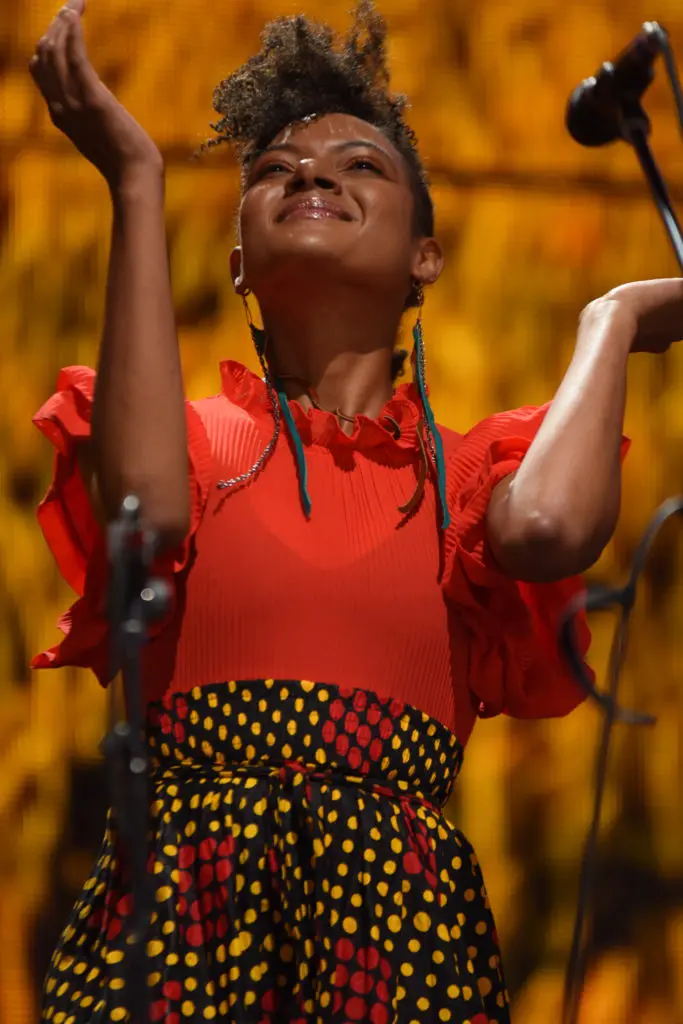
Allison Russell at Farm Aid 2022. Photo © Brian Bruner / Bruner Photo
Montreal born and Nashville based, Allison Russell is a Grammy, Juno, Americana and Folk Awards winning artist, actor, author, songwriter, producer, human rights advocate, survivor and mother. She is the co-founder of Once and Future Sounds and Love Rising. Her debut solo album “Outside Child” was released in 2021, followed by “The Returner” in 2023 via Concord/Fantasy Records.
Prior to her solo career she co-founded, recorded and toured internationally with the bands Po’Girl, Birds of Chicago, and Our Native Daughters. She is a member of Joni Mitchell’s Joni Jam band.
Russell’s ensemble the Rainbow Coalition opened for Hozier’s Unreal Unearth tour throughout 2024. Their All Returners headlining tour will continue Spring of 2025 in Australia and North America. Allison made her Broadway debut starring as Persephone in Anais Mitchell’s Hadestown from Nov 2024 to Feb 2025. Russell’s memoir will be published by Little Brown, release date TBA.
Episode 5: Artists on a burning planet
KURN: Welcome back to Against the Grain. This is episode five of our series on artists and activism. I’m Jessica Ilyse Kurn.
FOLEY: And I’m Michael Stewart Foley. If you’ve been paying attention to Farm Aid’s work over the last several years, you know that we’ve been working hard to get the public to understand that farmers are out there every day working on the front lines of climate change through a number of regenerative agricultural practices. Farmers are also finding ways to rehabilitate the soil and draw down carbon out of the atmosphere. These practices range from cover cropping to rotational grazing to agroforestry.
KURN: At Farm Aid’s annual festival, we hear from artists about the importance of supporting farmers in this work.
FOLEY: Good call. I can think of many examples of artists speaking about the environment. One that comes to mind is Neil Young’s introduction of his song “Love Earth,” last year at the festival.
YOUNG: What’s your favorite planet? What was that? Your favorite planet?
KURN: That was Neil Young and the Chrome Hearts, his new band, at their very first public performance at Farm Aid 2024 in Saratoga Springs, New York. Try and catch Neil in his aptly named Love Earth tour this summer, and of course at Farm Aid in Minnesota in September. On stage, he not only talks about taking care of the planet, but he also practices what he preaches.
FOLEY: Yeah, he’s brought Farm Aid’s HOMEGROWN Concessions from our festival grounds out on his Love Earth tour, swapping the usual food served at venues for local farm fresh food. Neil and Farm Aid work closely with our venue food partners to review all ingredients and make sure they meet Farm Aid’s high standards, which are food grown with ecological practices from family farmers who get paid a fair price. It’s a large undertaking, but one that’s important to Farm Aid and to Neil.
KURN: For a deep dive into the logistics on what it takes to get this amazing food to festival goers each year, you can listen to episode six from last season, “Connecting Farmers and Eaters.” When we come back, we’ll talk to another Farm Aid artist about taking a stand on climate change. Stay tuned for Lukas Nelson.
FOLEY: If you’re a farmer, Farm Aid is here for you. With 40 years of experience working with farmers, we strive to connect you with helpful services, resources, and opportunities specific to your individual needs. Our farmer resource network offers many ways for you to connect. If you want to talk with one of our hotline operators, call 1-800-FARMAID. That’s 1-800-327-6243. Or reach out online at www.farmaid.org/podcast.
LUKAS NELSON: I’m Lukas Nelson, and we are on the grounds of Farm Aid in Noblesville, Indiana.
KURN: As we were first launching against the grain in the summer of 2023, the horrible fires that engulfed Maui had just started to be contained. Wildfires in Hawaii used to be relatively infrequent. The islands are rarely dry enough, but thanks to climate change and the spread of invasive grasses, wildfire risk today is much greater for the island state.
FOLEY: Those devastating wildfires that killed 102 people on Maui in 2023 and destroyed much of the city of Lahaina brought all this home.
KURN: And Lukas Nelson spent part of his youth growing up on Maui. So he was on the ground when the fires happened, and we really wanted to hear his firsthand account. We connected with him backstage and asked him about the experience, starting with whether he considers himself a political artist and then about how he got involved on site in Maui during that wildfire emergency.
LUKAS NELSON: No, I don’t consider myself an activist or a political anybody necessarily, only in the sense that, you know, I’m affected by the world around me and so. You know, so I, I think when it comes to politics, uh, there’s too much that can get muddied by partisanship and so on, on, uh, you know, if somebody that you. don’t happen to agree with politically says something good. It makes it difficult for you to agree with them or to acknowledge publicly because, well, I’m aligned with the whole other side and so I don’t subscribe to any of that. I think if you have a good idea and you present it then it doesn’t matter where it’s coming from and we can compartmentalize those things now as an artist myself, I prefer to put my statements in my music. I prefer to put my my statements in my arse, uh, because I don’t believe that, you know, if I wanted to be a politician and stand on a soapbox, I would go out and do that, but I don’t want to alienate anyone. But farm aid is a non-political issue. I mean, I think there’s people on both sides of the aisle that I’ve seen say appreciative words. I understand the necessity of it.
FOLEY: We were interested in the work Lukas has done in the immediate aftermath of the Maui fires and wondered, wouldn’t that be considered activism?
LUKAS NELSON: I mean, this, this is just me helping my community, you know, I, I don’t feel like it’s activism at all. I just feel like I’m just, you know, I grew up there, I lived there, uh, and. Power lines flew over the non-native plants caused fires to start because of an extremely dry summer, and I think that there are practical things you can do to prevent that from happening in the future, and that’s what I think I was trying to use my platform to just make sure that. Whoever’s up there, I don’t care who you are, make sure that this doesn’t happen again, and at that point I was trying to implore everybody not to put the power lines above ground I don’t think it makes any sense. If that’s activism, then I don’t know what, you know, but I don’t consider myself an activist.
KURN: That’s the kind of fight you have to wage to end those wildfire threats in Maui and as Lukas says, to regenerate the soil and start healing our environment.
MICAH NELSON: This is Micah Nelson. We’re in Noblesville, Indiana at Farm Aid 2023.
FOLEY: It’s funny. While we were talking to Lucas that day in Indiana, you could hear his brother Micah playing on the main stage. It would have been cool if while we were talking to Micah, Lukas was playing, but the timing didn’t work out. We were excited that Micah stopped by our makeshift podcast setup in Indiana. You may recall that Micah composed and performs our Killer podcast theme music. And when he plays Farm Aid, it’s sometimes as Particle Kid, always with his dad Willie’s family band, and since last year, as a member of Neil Young’s band, The Chrome Hearts.
KURN: We started by asking Micah if the work he and Farm Aid are doing to address climate change is political.
MICAH NELSON: No, not really, no, I don’t think any of this is political at all. I mean, it’s just about being a person on a planet deciding whether you’re interested in supporting life or not, you know, because life, it’s delicate. It’s a delicate dance on a on a planet with a delicate ecosystem and the soil is the most fundamental source of life and you know it’s so much deeper than politics. It’s so much more cosmic than that, more existential than that. Sure that politics are are involved or they should they should be.
In the sense that uh you know the people that are representatives of communities or states or countries um should be paying attention to this and talking about it a lot more and recognizing what’s at stake, you know, we should be asking political leaders where they get their food from, and that’ll tell you a lot about. Where their priorities are, so in that way it’s political, but I don’t, I don’t think about it that way really in terms of partisanship or I think it’s a bipartisan issue. It affects everybody regardless of your political leanings, so it’s it’s outside of that to me, even though everything’s intertwined, I think it should be approached as just a human issue.
KURN: This is one of the things that I’ve loved about asking the same questions to so many artists. The variety of responses has been fascinating.
FOLEY: Right, in Micah’s case, kind of like in Lukas’s, the term political is too limiting, particularly that it seems to conjure for him a sense of partisanship or division, same way Lukas talked about the term activism.
KURN: We covered lots of topics with Micah, enough to fill a few podcast episodes. But for this one, let’s hear what he has to say about what we all can do for the environment.
MICAH NELSON: People want to learn, I think, more than ever. They want to learn how to be resilient. They see what’s going on in the world, learning this stuff makes you less fearful. People want that knowledge and the experience, I think.
FOLEY: For context, here he was referencing Farm Aid’s HOMEGROWN Village, which is such an important part of the festival experience that happens every year, and in particular the Skills Tent where festivalgoers can learn a variety of skills like square foot gardening, cheese making or composting.
MICAH NELSON: And so having a space where you can tell people come here and we’ll show you how to do it and then you can do it on your land or or you you know you can apply these skills to whatever you’ve got going on because everywhere is different, every microclimate and every landscape, but no matter where you are, soil is king. As long as you figure out how to get your soil healthy and happy. Thriving then then you can kind of do anything, or at least you can do a lot more than you would have otherwise. Some people are maybe more driven and more, you know, passionate about it, or maybe that their life depends on it, their livelihood, but it’s science and it’s nature. It’s right there. Just look at look outside and you’ll see it happening.
MICAH NELSON: Self-sufficiency gives you confidence, gives you something to give to some. else too, you know, and that’s these kinds of conversations I think are naturally going to become more and more frequent and the more the everyday person has this type of knowledge, you know, the idea of saving the world is really big, but it’s just really about saving your town, you know, saving your community and the little things that make up the world.
KURN: Community and science. Relying on these concepts feels productive, and there’s a common sense case for relying on science in this historical moment, especially when we’re hearing powerful people be so dismissive of science and data.
FOLEY: When we come back, we’ll hear from Allison Russell, who’s performed at a number of Farm Aid festivals in recent years.
KURN: She tells us about her experiences and observations of climate change as a touring musician.
FOLEY AD: Farm Aid 40 will be at Huntington Bank Stadium in Minneapolis on Saturday, September 20th. We hope you’ll be there too. Tickets are still available. Head to Farmaid.org/podcast for details.
RUSSELL: I’m Alison Russell. I’m a mother, a musician, an activist, an author, an artist, and I live now in Nashville, Tennessee, but I’m from Montreal, Quebec, Canada. I’m a Scottish Grenadian Canadian, a Queer, Black, new immigrant to America.
FOLEY: We featured Allison Russell on the second episode of our podcast when we first discussed corporate concentration in the farming and food sectors with Dave Matthews and others. You can find that episode with all of our episodes at FarmAid.org/podcast.
RUSSELL: I think everything is political. I think it’s semantics when people try and say, I don’t want to get political. Saying I don’t want to be political is a political statement in and of itself, right? We, every part of our life is regulated by policy, right? There’s um when we talk about what does political mean, it doesn’t mean we’re asking you to endorse a particular candidate, but every choice that we make with our dollars, Margo really dug in on this at Farm Aid, where do we put our dollars and what are the political ramifications of where we put those dollars.
KURN: Allison stands on everything being political, right down to how we make decisions about the food we buy, just shows how many opinions there are from people doing good work.
RUSSELL: Every single thing we do, from the meat that we buy to the produce that we buy to the policymakers that we support, um, you know, to the clothes that we wear, to the cars that we drive or don’t drive, all of it has a political existence and ramification and so none of us gets to say, gets to be free of politics to some degree, I know that’s a semantic um sort of block for some folks, but we just have to face that we are In constant communion and connection with each other and everything that we do affects everyone else. And so life is political. It just is, whether we want to say it or not, talk about it or not, it just is.
KURN: Alison spoke passionately about industrial scale farm and food production and how it negatively affected not only our physical environment, but also our spirits.
RUSSELL: It’s so, so intertwined because our mental health as a species has been suffering as we get more and more disconnected from the fact that the earth is our mother and we need every part of her in order to thrive. We’re not in dominion over. We are in symbiosis, well, hopefully in symbiosis with unfortunately we’ve been out of whack. We’ve been extracting too much because we Uh, have been trapped in this idea of um exponentially increasing increasing profit forever and ever. Amen, which is, which is a cancerous way to think and a cancerous way to behave on the planet and it hurts the planet, yes, but it hurts us the most and the species that we take with us. So I, I think, and, and as a result of that, we feel greater and greater schisms within our own psyche.
I think, you know, that I don’t think it’s any coincidence that um mental health suffers the most in in urban centers, you know, where we are so, so, so disconnected from the rhythms of the earth, from the mycelial network, from the the boon that walking through a forest and breathing in. All of that beautiful oxygen from the forest. Like we need we need our mother to be OK. And when we are so so removed from those diurnal rhythms and earth rhythms, circadian rhythms that we suffer.
FOLEY: This sounds pretty cosmic, as Micah said earlier. Here’s Alison’s takeaway from talking to farmers on site at the festival.
RUSSELL: We were talking about last year and what the farmers for climate resilience and better policy to sustain and support and have the same kind of tax breaks and subsidies and and and payouts for farmers who are doing the work to reverse climate destruction and fatal climate change, you know, as opposed with these, these massive factory farms are getting, it’s not, it’s not they’re getting subsidized, they’re getting all kinds of hidden Sources of both hidden and upfront sources of funding that we’re not seeing that happening for the family farms. We’re not seeing that happen for specifically farmers working to put oxygen back into our atmosphere.
KURN: The stakes could not be higher for all of us.
RUSSELL: If we don’t get our food supply right, it so exponentially harmfully impacts every other thing that we’re facing. You know, like that’s if we had clean, healthy food available to everyone on farms that did not exacerbate the climate crisis, that would be transformative. We can make these changes and that’s what we’re talking about every year at Farm Aid, and that’s what we’re working on every year, and that feels really positive and hopeful to me to get to be part of it.
FOLEY: We’ve got two more amazing episodes coming up in this series on artists and activism, so we hope you’ll keep tuning in.
KURN: Next week, more from Alison Russell, Waylon Payne and Hunter Park, who performs as She Returns from War. We’ll chat about the politics of everyday life, not only for artists, but also for anyone who needs to find a chosen family or community where they can feel safe and be treated with dignity.
RUSSELL: You know, I was 15 and I knew that I was safer sleeping in a graveyard on a park bench than I was in the home of the people who called themselves my family at that time. You know, and then eventually we need community, we need, we need, we don’t, we’re not, we don’t thrive in isolation.
FOLEY: That was Allison again as a teaser for our next episode. And speaking of community in the final episode of this series, we’ll take you back to Luck Reunion, where we recorded a live conversation with artists who’ve lived through climate disasters. They spoke powerfully about how to maintain and sustain community in the face of these kinds of horrific events. You don’t want to miss it.
KURN: Is there something you want us to cover in the future? Send us an email or drop a comment. You can email us at podcast@farmaid.org and find us on social media, which is @Farmaid on Instagram, Facebook, threads and now on BlueSky.
FOLEY: And don’t forget YouTube, where you can watch almost 40 years of performances and other content. Let your friends know about Against the Grain. We’re beyond grateful when you listen, share, like and subscribe to this podcast.
KURN: Against the Grain was written and produced by us with sound editing by Endhouse Media and direction from Dawn Sarokin. And thanks to Micah Nelson for our awesome theme music.
FOLEY: Thanks so much to all the artists who took the time to speak with us. Head over to our website to watch videos, check out those playlists, and learn more. www.farmaid.org/podcast. And thanks to all the farmers out there. We’ll chat with you next time.

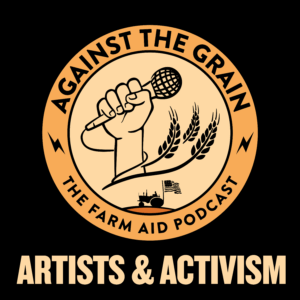 Listen to the Artists and Activism series of Against the Grain: The Farm Aid Podcast to hear from more than two dozen artists who use their art and voices as vehicles for political engagement and expression on issues that matter to them.
Listen to the Artists and Activism series of Against the Grain: The Farm Aid Podcast to hear from more than two dozen artists who use their art and voices as vehicles for political engagement and expression on issues that matter to them.
